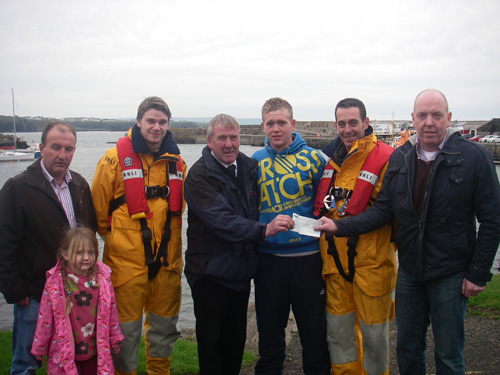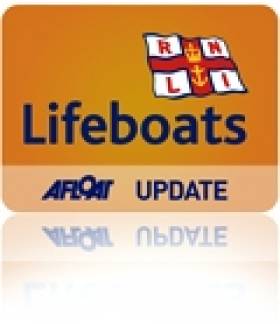Displaying items by tag: Paul McGuigan
Family Say 'Thank You' to Portrush Lifeboat for Saving Son
A grateful family presented a cheque to Portrush lifeboat crew in thanks for saving their son this summer.
On 16th May 2010 both Portrush Lifeboats were launched to two separate incidents within one at 0922 hours and one at 0924 hours.
Within minutes two full volunteer crews had assembled and both the All-weather Lifeboat and the Inshore Lifeboat were launched. The Inshore Lifeboat was launched to reports of two young people in the water at Dhu Varren. Karl O'Neill was at the helm supported by Nick Christie and Jonathan Weston. Two youths had gone into the sea after a dog, and were starting to experience real difficulties in getting back to shore. One of the youths Damian Morris had sustained cuts to his arms and legs, was suffering hypothermia and was literally going under the water for the third time when the Portrush Lifeboat arrived on scene. Damian spent several days in hospital as a result of the incident and was delighted to be able to come to the station to meet the crew who had saved him that day.
Damian's uncle and Godfather Raymond Comac and his friend Paul McGuigan, do a lot of charity work in Damian's hometown in Omagh holding fundraisers to raise funds to take motorbikes out to South Africa for use by health care workers in the townships. However this year, they divided the proceeds between their charity and the RNLI, in recognition of the fact that the volunteer crew at Portrush had saved Damian's life.
Damian's parents Liam and Rosemary Morris, Damian himself and his uncle Raymond and friend Paul travelled to Portrush to meet the crew and hand over a cheque for £1000. Both Nick and Karl were overwhelmed by the generosity and stated;
'We don't do this for thanks, but it's so nice to meet someone that you have helped and for this amount to be raised is fantastic for the station'
The family got a tour of the station and had a look at the new Inshore lifeboat 'The David Roulston' which took over from the 'Ken and Mary' the boat that responded to the call that day....one of her last launches.

Related Safety posts
RNLI Lifeboats in Ireland
Safety News
Rescue News from RNLI Lifeboats in Ireland
Coast Guard News from Ireland
Water Safety News from Ireland
Marine Casualty Investigation Board News
Marine Warnings
























































